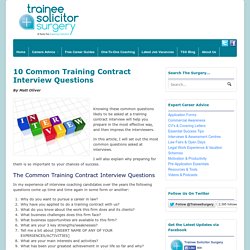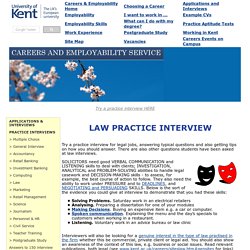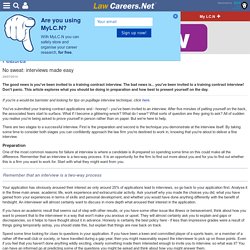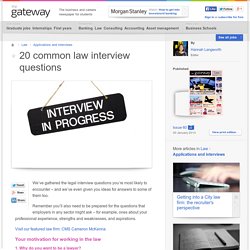

10 Common Training Contract Interview Questions. By Matt Oliver Knowing these common questions likely to be asked at a training contract interview will help you prepare in the most effective way, and then impress the interviewers.

In this article, I will set out the most common questions asked at interviews. I will also explain why preparing for them is so important to your chances of success. The Common Training Contract Interview Questions In my experience of interview coaching candidates over the years the following questions come up time and time again in some form or another: Why do you want to pursue a career in law? Why Preparing For Them Is So Important Being able to provide solid answers to these specific questions, or close variants of them, is often the difference between success and failure at interview.
Preparing for these questions also increases your self-awareness, improves your communication and helps to calm your nerves. Increases Self-Awareness Clearly, to receive the job offer, this is what you are going to have to do. Law Practice Interview. Try a practice interview for legal jobs, answering typical questions and also getting tips on how you should answer.

There are also other questions students have been asked at law interviews. SOLICITORS need good VERBAL COMMUNICATION and LISTENING skills to deal with clients; INVESTIGATION, ANALYTICAL and PROBLEM-SOLVING abilities to handle legal casework and DECISION-MAKING skills - to assess, for example, the best course of action to follow. They also need the ability to work under PRESSURE and to DEADLINES, and NEGOTIATING and PERSUADING SKILLS. Below is the sort of the evidence you could give at interview to demonstrate that you had these skills: Solving Problems.
Interviewers will also be looking for a genuine interest in the type of law practised in the firm whether this be commercial, private client or legal aid. The questions asked in this practice interview are typical of those that might be asked of students at interviews for solicitors' training contracts. Interview_tips.pdf. No sweat: interviews made easy - Features. If you're a would-be barrister and looking for tips on pupillage interview technique, click here.

You've submitted your training contract applications and - hooray! - you've been invited to an interview. After five minutes of patting yourself on the back, the associated fears start to surface. What if I become a gibbering wreck? What do I wear? There are two stages to a successful interview. Preparation One of the most common reasons for failure at interview is where a candidate is ill-prepared so spending some time on this could make all the difference.
Remember that an interview is a two-way process Your application has obviously aroused their interest as only around 25% of applications lead to interviews, so go back to your application first. If you have an academic result that seems out of step with other results, or you have some other issue like illness or bereavement, think about how you want to present that to the interviewer in a way that won't make you anxious or upset. Careers Service. List of Law Firm Interview Questions. 20 common law interview questions. We’ve gathered the legal interview questions you’re most likely to encounter – and we’ve even given you ideas for answers to some of them too.

Remember you’ll also need to be prepared for the questions that employers in any sector might ask – for example, ones about your professional experience, strengths and weaknesses, and aspirations. Visit our featured law firm: CMS Cameron McKenna Your motivation for working in the law 1. Why do you want to be a lawyer? 2. Many different types of people succeed in the law and your answer will be dependent on your personality. Lawyers at law firms work in groups, learning from those senior to them and training those junior to them, so an ability to work in a team is crucial. In addition, lawyers need to have an academic mindset to understand laws and legal theory, but must also be able to apply common sense and think about the wider commercial context of their work. 3. 4. Your understanding of a job in the law 5. 6. 7. 8. Your understanding of the firm.